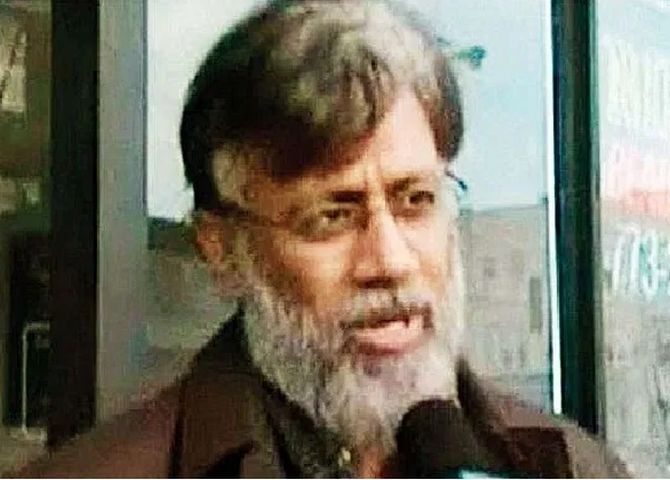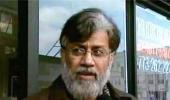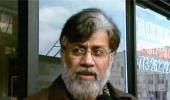Pakistani-origin Canadian businessman Tahawwur Rana, a key accused in the 26/11 terror attacks case, stayed at a hotel in Mumbai's Powai area for two days in November 2008 ahead of the attacks, where he discussed about the crowded places in south Mumbai with a witness in the case, the police said on Tuesday.

The places that Rana discussed with the key witness include the sites in south Mumbai that were targeted by Pakistani terrorists during the deadly attacks, a police official said.
On Tuesday, the Mumbai police filed an application in a court here, seeking issuance of a non-bailable warrant against Rana so that further legal processes can be initiated, he said.
This comes a day after the city police's crime branch submitted the over 400-page supplementary chargesheet, the fourth in the case so far, before a special court hearing cases related to the Unlawful Activities (Prevention) Act (UAPA).
Rana, currently under detention in the United States, faces multiple charges for his role in the Mumbai attacks and is known to be associated with Pakistani-American terrorist David Coleman Headley, one of the main conspirators of the 26/11 strikes.
"Police found evidence that Rana had landed in Mumbai from Dubai on November 11, 2008, and stayed in India till November 21. The crime branch has evidence in the form of statements and documents that Rana was in Mumbai on November 20 and 21," a senior official of the Mumbai police's crime branch said.
"In Mumbai, he stayed at Hotel Renaissance in Powai for two days, where he discussed the crowded places of south Mumbai that were later targeted by the terrorists," the official said, adding that the police are also probing whether he visited places other than Mumbai during his stay in India.
"Police are also probing whether Rana had personally visited the places which were targeted by the terrorists," he added.
Some of the places in south Mumbai that the terrorists targeted include the Chhatrapati Shivaji Maharaj Terminus (CSMT), the Taj Mahal Palace Hotel and Leopold Cafe.
Rana is a co-conspirator of the 26/11 terror attacks. He was very much aware of the conspiracy, that is why he came to India and left the country days before the attacks, the police official said.
"We have found documentary evidence against Rana and some statements in which his role in the 26/11 conspiracy was established. The documentary evidence shows that Rana was actively involved in the conspiracy with Pakistani-American terrorist David Coleman Headley, one of the main conspirators of the 26/11 strikes," he said.
"After filing the chargesheet before the court, the crime branch on Tuesday moved an application before the court seeking issuance of non-bailable warrant against Rana. The non-bailable warrant is required to start further legal processes against him," he said.
The crime branch officials have also got the evidence that Rana had travelled to various countries, except India, with David Coleman Headley, the official said.
"The crime branch has found email communications between Headley and Rana," he said, adding that in one of the emails related to 26/11 terror attacks, Headley asked for Major Iqbal's email id, he said.
Major Iqbal, an operative of the Pakistani intelligence agency Inter-Services Intelligence (ISI), was named as an accused in the 26/11 terror plot case, he said.
Meanwhile, a hearing on the cognisance of the chargesheet was scheduled to be held on Tuesday. However, it could not take place due to some technical issues. The matter will now come up for hearing on Wednesday.
Talking to media persons outside the court, special public prosecutor Ujjwal Nikam said that he would present a "catalogue of evidence" against Rana to the judge.
"He (Rana) was deeply involved in the conspiracy of the attacks and his name was first revealed by David Headley," he said.
Rana was also in touch with Pakistani army officials, Nikam added.
Headley, a Pakistan-born American national and Lashkar-e-Taiba (LeT) operative, is serving a 35-year jail term in a US prison for his role in the 26/11 terror attacks.
A total of 166 people were killed when 10 terrorists from Pakistan arrived by sea route on November 26, 2008, and laid a more than 60-hour siege in the financial capital during which they targeted the city's landmarks, a hospital and a Jewish centre, among other places.
Among the 10 terrorists was Ajmal Kasab, who was caught alive and later put on trial and sentenced to death by a special court.
He was hanged to death at Pune's Yerawada central prison in November 2012, two years after being held guilty in the case by the court.










